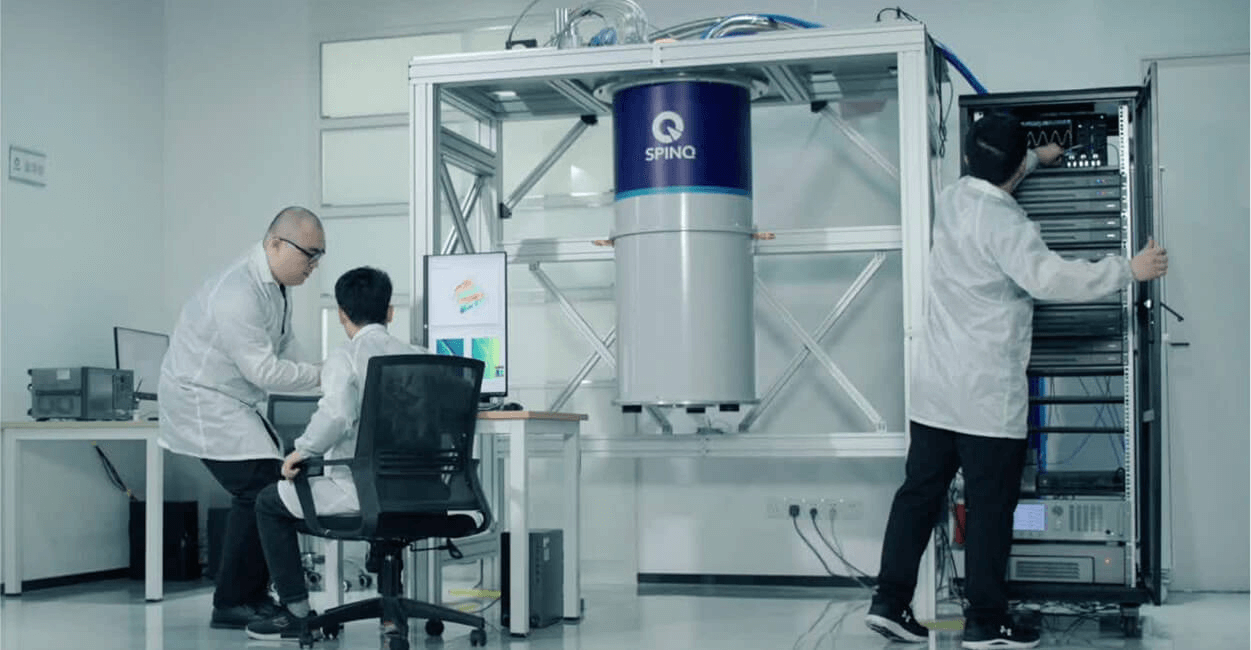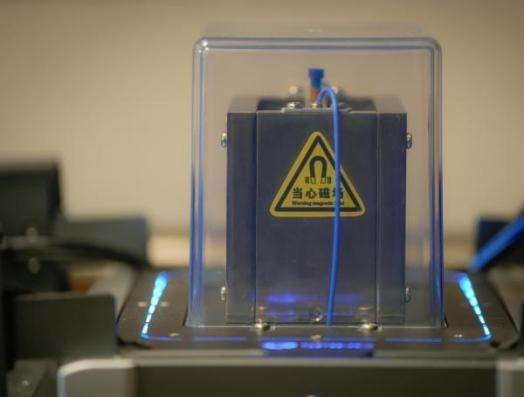Free Open Source Quantum Computer Training: Unlocking Tomorrow's Technology Today
2025.09.12 · Blog Free Open Source Quantum Computer Training
Quantum computing stands at the forefront of technological revolution, promising to solve complex problems that are beyond the reach of classical computers. While the field was once confined to elite research laboratories, the landscape has dramatically shifted with the emergence of free open source quantum computer training resources that democratize access to this transformative technology.
The Quantum Education Revolution

The quantum education ecosystem has undergone a remarkable transformation. What was once accessible only to researchers at prestigious institutions is now available to anyone with an internet connection and the drive to learn. This democratization represents one of the most significant developments in scientific education, breaking down traditional barriers of cost, geography, and institutional access.
Free open source quantum computer training combines three powerful elements: accessibility through no-cost education, transparency through open-source tools, and practicality through hands-on experience with real quantum systems. This convergence creates unprecedented opportunities for learners at all levels to engage with quantum technologies.
Leading Platforms for Free Quantum Training
IBM Quantum Experience: The Pioneer Platform
IBM's quantum platform stands as perhaps the most established free quantum training resource. The IBM Quantum Experience provides comprehensive access to both quantum simulators and real quantum hardware, supported by the open-source Qiskit framework. Key features include:
-
Free step-by-step guides with Python and Qiskit coding examples
-
Access to real IBM quantum computers for algorithm execution
-
Continuously updated content maintained by IBM researchers
-
Active global community providing peer support and collaboration opportunities
The platform's Qiskit learning pathway offers structured progression from basic concepts to advanced quantum programming, making it accessible for beginners while providing depth for experienced practitioners.
Microsoft Azure Quantum: Enterprise-Grade Learning
Microsoft's quantum learning initiative provides comprehensive training through their Azure Quantum platform. The program emphasizes practical quantum programming using Microsoft's Q# language, offering both theoretical foundations and hands-on development experience. The Q# programming language meets essential requirements for quantum development, including hardware-agnostic design and integration of quantum and classical computing.
Google's Open Source Contributions
Google's quantum ecosystem centers around Cirq, an open-source framework designed for near-term quantum processors. The platform provides tools for building and experimenting with noisy intermediate-scale quantum (NISQ) algorithms. Google's commitment to open-source quantum development extends through multiple frameworks that support various aspects of quantum computing research and education.
SpinQ's Comprehensive Quantum Education Ecosystem
SpinQit Framework: Bridging Theory and Practice
SpinQ has developed a unique approach to quantum education through its SpinQit Quantum Computing Programming Framework. This Python-based platform supports multiple programming syntaxes and provides cross-platform execution capabilities, connecting seamlessly with quantum computers, simulators, and cloud platforms.
Key features of SpinQit include:
-
Multi-Language Compatibility: Support for Python, OpenQASM 2.0, and Qiskit syntax
-
Cross-Platform Execution: Runs on physical hardware, cloud platforms, and simulators
-
Rich Algorithm Library: Pre-built algorithms and NISQ-era techniques like variational quantum algorithms
-
Educational Integration: Seamless integration with classical ML frameworks like PyTorch and TensorFlow
SPINQ Cloud Platform: Democratizing Quantum Access
The SPINQ Cloud Quantum Computing Cloud Platform represents a significant advancement in accessible quantum education. This comprehensive platform provides:
-
Real Machine Resources: Connection to quantum computers with 2, 3, 5, and 8 qubits
-
High-Performance Simulation: Up to 24-qubit full-amplitude quantum simulator
-
Online Programming Environment: Interactive interfaces and code development tools
-
Algorithmic Applications: Visual, configurable quantum computing application cases
The platform's strength lies in its combination of real quantum hardware access with sophisticated simulation capabilities, enabling users to progress from learning basic concepts to implementing complex algorithms on actual quantum systems.
Educational Hardware: Making Quantum Tangible

SpinQ's educational approach extends beyond software to include physical quantum computing systems designed specifically for learning environments. The company's educational-grade quantum computers, including the Gemini Mini series and Triangulum systems, provide hands-on experience with real quantum phenomena while maintaining the accessibility needed for classroom environments.
These systems feature:
-
Room-temperature operation with maintenance-free design
-
Complete learning resources including courses and exercises
-
Authentic quantum computing capabilities on real teaching instruments
-
Comprehensive quantum programming support through multiple interfaces
Open Source Quantum Machine Learning Revolution
PennyLane: Bridging Quantum and Classical ML
PennyLane emerges as a standout platform for quantum machine learning education. This cross-platform Python library specializes in quantum computing, quantum machine learning, and quantum chemistry. Built by researchers for research, PennyLane offers:
-
Integration with major ML frameworks: PyTorch, TensorFlow, JAX, Keras, and NumPy
-
Quantum-aware optimization: Hardware-compatible gradients for advanced research
-
Comprehensive algorithm support: From NISQ to fault-tolerant quantum computing
-
Quantum datasets: Pre-simulated datasets to accelerate algorithm development
Expanding ML Integration
The quantum machine learning ecosystem continues to evolve with sophisticated open-source frameworks. Qiskit Machine Learning provides high-level Python libraries that combine quantum computing with traditional machine learning, offering both theoretical foundations and practical implementation tools.
Global Impact and Success Stories
University Implementations
The global adoption of free quantum training resources has yielded remarkable success stories. Hong Kong University of Science and Technology has leveraged SpinQ's educational systems to enable students to conduct original research projects using real quantum hardware. These implementations demonstrate how accessible quantum education can immediately contribute to scientific advancement.
Beijing Institute of Technology successfully implemented quantum technology courses for undergraduate students, with hundreds of students completing quantum precision measurement experiments. This scale of implementation showcases the practical viability of quantum education in traditional academic settings.
K-12 Innovation
Perhaps most remarkably, quantum education has successfully extended to secondary education. Shenzhen Middle School established a complete quantum computing elective program from scratch, demonstrating that complex quantum concepts can be made accessible to younger learners when supported by appropriate tools and methodologies.
The Mathematics and Programming Foundation
Essential Mathematical Concepts
Successful quantum programming requires mastery of several mathematical disciplines:
-
Linear Algebra: Essential for representing quantum states and unitary transformations
-
Probability Theory: Critical for understanding quantum measurements
-
Complex Numbers: Fundamental for expressing quantum states and wave functions
-
Fourier Analysis: Applied in algorithms like Quantum Fourier Transform
Programming Language Landscape
Python dominates the quantum programming landscape, serving as the foundation for most major quantum frameworks. Key quantum programming languages and frameworks include:
-
Qiskit (IBM): Python-based, open-source framework
-
SpinQit (SpinQ): Python-based with cross-platform compatibility
-
Cirq (Google): Focused on near-term quantum algorithms
-
Q# (Microsoft): Specialized quantum programming language
Certification and Professional Development
Industry-Recognized Credentials
The quantum education landscape now includes robust certification programs that validate professional competency. IBM's Qiskit developer certification has certified over 1,300 quantum computational scientists across 71 countries. The updated Qiskit v2.X certification ensures that professionals maintain current skills with the latest quantum software developments.
Career Impact
Quantum certification provides tangible career benefits, with hiring managers noting that quantum credentials help applicants stand out in competitive job markets. The certification serves as a valuable addition to resumes and LinkedIn profiles, helping professionals catch recruiter attention even during passive job searches.
Future Directions and Emerging Trends
Quantum-Classical Hybrid Learning
The future of quantum education increasingly emphasizes hybrid quantum-classical approaches. This integration enables learners to leverage existing classical computing knowledge while gradually building quantum expertise. Modern quantum machine learning frameworks exemplify this approach, seamlessly connecting quantum circuits with established machine learning libraries.
Community-Driven Development
The open-source nature of quantum education tools fosters global collaboration and rapid innovation. Platforms like GitHub host extensive repositories of quantum computing resources, enabling community contributions and shared learning experiences that accelerate the development of educational materials.
Scalability and Accessibility
As quantum technologies mature, educational platforms continue expanding their reach and capabilities. Cloud-based quantum access enables global participation in quantum education, regardless of local infrastructure limitations. This scalability ensures that quantum education can reach underserved communities and developing regions.
Practical Getting Started Guide
Step-by-Step Approach
For newcomers to quantum computing, the path to proficiency follows a structured progression:
-
Master quantum fundamentals: Understand qubits, quantum gates, and measurement
-
Learn foundational algorithms: Study Grover's and Shor's algorithms
-
Gain hands-on experience: Use quantum programming frameworks
-
Join online courses: Engage with structured learning programs
-
Experiment with real systems: Access cloud-based quantum computers
Resource Selection
When choosing quantum learning resources, consider platforms that offer:
-
Comprehensive coverage from basic concepts to advanced applications
-
Real hardware access for authentic quantum experience
-
Community support for collaborative learning
-
Industry recognition through certificates or credentials
-
Regular updates to maintain currency with technological advances
Conclusion: The Quantum Future Starts Now
Free open source quantum computer training represents more than an educational trend—it embodies a fundamental shift toward democratized access to revolutionary technology. The convergence of no-cost education, open-source tools, and real quantum hardware access creates unprecedented opportunities for learners worldwide.
Whether you're a student exploring career options, a professional seeking to expand your skill set, or an educator looking to integrate quantum concepts into your curriculum, free quantum training resources provide the foundation for success in our quantum future. The combination of theoretical knowledge, practical programming skills, and hands-on hardware experience offered by platforms like SpinQ's educational solutions, IBM Quantum Experience, and open-source frameworks ensures learners are prepared for the quantum-enabled future.
The quantum computing revolution is not waiting—and neither should you. With comprehensive free training programs providing world-class education and real hardware access, there has never been a better time to begin your quantum computing journey. The future of technology is quantum, and that future starts with education today.
As quantum technologies transition from research laboratories to practical applications, the professionals trained through these free programs will drive innovation across industries. The only question remaining is: when will you take your first quantum step into tomorrow's technology?
Featured Content






